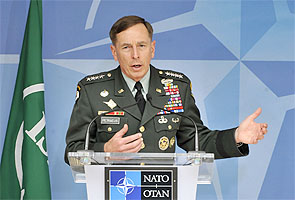Happy birthday to me,
Happy birthday to me,
Happy birthday dear Barry,
Happy birthday to me.
Today is Barack Obama’s 49th birthday and an ideal time to mark a little more than a year and a half causing havoc in the White House. What could be more appropriate to celebrate his 18 months of self interest and self involvement than a day honoring him?
According to the Associated Press, Obama will have dinner with friends and then settle down to a nice evening in his Hyde Park house. With his wife and children away, he’ll be “spending his birthday instead as a bachelor.” That’s the metaphor for the Obama presidency. He’ll be spending his birthday with his favorite person – himself.
Since Obama took office January last year, he’s talked endlessly about himself. At town halls, in speeches, during anniversaries and to the press, the message has always been the same: “I.” Obama has spoken some form of “I” or “me” more than 16,000 official times since he took office.
16,000.
I. I. YI. YI.
Imagine 16,000 of anything and you are talking big numbers.
Instead of 16 candles, light 16,000, but have the fire department on speed dial.
Refer to yourself once a day (something that never happens in Obamaland) and it will take you more than 40 years to equal Obama.
Turn that 16,000 into dollars and you could buy the new 2011 VW Jetta when it comes out in October.
With an extra 16,000 votes, the conservatives would have won a total majority in Britain during the last election.
But when you talk about yourself 16,000 times during roughly 18 months, you have a problem.
When it’s the president of the United States, the most powerful man in the world, we all have an “I” problem.
Forget the news of the day – economy, race, pro football or Lindsay Lohan. To the Narcissist-in-Chief, all days might end in a “y,” but every day starts with an “I.”
Obama has spoken or made remarks more than 700 times and counting – on everything from the economy to LGBT Pride Month. But he always comes back to one topic – himself.
(Of course, the Obama administration makes it easier to examine the Mountain of Me via the White House website and it's a major endeavor. Trying to recreate eight years of. Bush or Clinton would be even more challenging.)
Speaking to Senate Democrats on Feb. 3, he discussed working with the GOP: “And I told them, I want to work together when we can, and I meant it. I believe that's the best way to get things done for the American people.” That’s four “I” words out of 30 designed to be about “the American people.”
Want to talk economy? Obama talks Obama.
When he visited the hard-hit Pennsylvania city of Allentown, it was all “I” with a smattering of “me” for good measure. “So from the moment I was sworn into office, I began taking a number of difficult steps to end this economic crisis. And by the way, can I just say I didn’t take these steps because they were popular or because they were particularly gratifying to me – they weren’t,” he told the crowd.
Every “I” should have been expected. The night of the election, NBC’s Chuck Todd was quick to call Obama “post-boomer,” meaning the president wasn’t really one of the 78 million Baby Boomers. “Basically a post-baby boomer has just won the presidency. I've had people argue with me, well, technically Obama was right there at the tail end of the Baby Boomer,” he told election viewers.
Todd was confused by the youngish attitudes and alleged tech savvy of the new president and grouped him with Gen. X. But Obama is a boomer, just as Bill Clinton before him.
They share the same love of the crowd (though hopefully not Bill’s up-close-and-personal way of expressing it). The late comedian George Carlin described it perfectly, calling boomers (us!) “whiny, narcissistic, self-indulgent people with a simple philosophy: ‘Give me it. It's mine. Give me that. It's mine.’”
It’s like Carlin knew Obama personally.
The president whines at the simplest affront, builds enemies lists of critical media and talks about himself like he was writing his third autobiography in real time.
Every major action in the past year has been part of a continuous string of “gimmes.” Give me control of health care. Give me control of the auto industry. Give me control of Wall Street and lots more.
It’s an extreme form of the classic Democratic give-and-take strategy. We give. They take.
But there’s only so much giving the voting and taxpaying public is willing to tolerate. The wiser the voters get to Obama’s agenda, the more his poll numbers drop. It’s a boomer bust cycle.
But November is coming and with it, a partial day of reckoning. Right now, the opposition is growing – whether they are classic conservatives, tea partiers, rabid independents or disaffected Democrats.
Come Election Day, no matter how many times he talks about himself, Obama only gets one vote.
Researcher Katie Bell contributed to this piece.
















